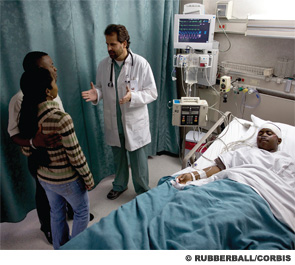User login
“We’ve gone through an interesting 15 years where hospitals needed to build hospital medicine programs,” said Dr. Wachter, chief of the division of hospital medicine at the University of California at San Francisco, to conference attendees in San Francisco in October. “In the beginning, we were young and had to try to lead, even though we didn’t understand how organizations worked. We had a good voice at the table even before we were ready for it. Now we’re more mature and better leaders, but the problems are harder.”
Asked to name the reform trends most important to hospitalists, Dr. Wachter replied, “Cost pressures, one, two, and three. The system is going to push us to deliver higher-value care at lower cost, with greater standardization and elimination of waste.”
That means adhering to medical guidelines, avoiding unnecessary care, and managing hospital lengths of stay. Likewise, Dr. Wachter anticipates that clinicians will be pushed to practice at the top of their licensure, with new and interesting roles for nurse practitioners and physician assistants.
“But I think the market for hospitalists is good. Those hospitals that survive will all have hospitalists,” he said.
How can hospitalists prepare for healthcare reform?

—Dr. Wachter
“Some of it is to make yourself indispensable, so that when hard decisions come up about whether to spend resources on you or something else [in the hospital], people will say, ‘We get a lot of bang for our buck spending on hospitalists,’” Dr. Wachter added. “And now and then, you’ll need to pull out your copy of Machiavelli,” he noted, referring to the Italian diplomat’s classic book, The Prince, for its maxims on the art of retaining and wielding political power.
Dr. Wachter also has a particular interest in healthcare information technology (IT) and how it is reshaping medical practice, having taken a sabbatical to write a book on the subject, The Digital Doctor: Hope, Hype & Harm at the Dawn of Medicine’s Computer Age, scheduled for publication on March 15.
Acknowledging the problems many hospitalists have experienced with electronic health records, Dr. Wachter predicts some positive changes.
“I think it will get better pretty quickly. Many of us were quite naïve to think that IT would make care safer. We didn’t give enough attention to how technology changes everything, from workflow to personal relationships,” he said. “Now that these systems are in place, we need to ask: Are they really doing the things we want and not doing the things we don’t want? And how do we leverage these systems to get maximum value?”
Larry Beresford is a freelance writer in Alameda, Calif.
“We’ve gone through an interesting 15 years where hospitals needed to build hospital medicine programs,” said Dr. Wachter, chief of the division of hospital medicine at the University of California at San Francisco, to conference attendees in San Francisco in October. “In the beginning, we were young and had to try to lead, even though we didn’t understand how organizations worked. We had a good voice at the table even before we were ready for it. Now we’re more mature and better leaders, but the problems are harder.”
Asked to name the reform trends most important to hospitalists, Dr. Wachter replied, “Cost pressures, one, two, and three. The system is going to push us to deliver higher-value care at lower cost, with greater standardization and elimination of waste.”
That means adhering to medical guidelines, avoiding unnecessary care, and managing hospital lengths of stay. Likewise, Dr. Wachter anticipates that clinicians will be pushed to practice at the top of their licensure, with new and interesting roles for nurse practitioners and physician assistants.
“But I think the market for hospitalists is good. Those hospitals that survive will all have hospitalists,” he said.
How can hospitalists prepare for healthcare reform?

—Dr. Wachter
“Some of it is to make yourself indispensable, so that when hard decisions come up about whether to spend resources on you or something else [in the hospital], people will say, ‘We get a lot of bang for our buck spending on hospitalists,’” Dr. Wachter added. “And now and then, you’ll need to pull out your copy of Machiavelli,” he noted, referring to the Italian diplomat’s classic book, The Prince, for its maxims on the art of retaining and wielding political power.
Dr. Wachter also has a particular interest in healthcare information technology (IT) and how it is reshaping medical practice, having taken a sabbatical to write a book on the subject, The Digital Doctor: Hope, Hype & Harm at the Dawn of Medicine’s Computer Age, scheduled for publication on March 15.
Acknowledging the problems many hospitalists have experienced with electronic health records, Dr. Wachter predicts some positive changes.
“I think it will get better pretty quickly. Many of us were quite naïve to think that IT would make care safer. We didn’t give enough attention to how technology changes everything, from workflow to personal relationships,” he said. “Now that these systems are in place, we need to ask: Are they really doing the things we want and not doing the things we don’t want? And how do we leverage these systems to get maximum value?”
Larry Beresford is a freelance writer in Alameda, Calif.
“We’ve gone through an interesting 15 years where hospitals needed to build hospital medicine programs,” said Dr. Wachter, chief of the division of hospital medicine at the University of California at San Francisco, to conference attendees in San Francisco in October. “In the beginning, we were young and had to try to lead, even though we didn’t understand how organizations worked. We had a good voice at the table even before we were ready for it. Now we’re more mature and better leaders, but the problems are harder.”
Asked to name the reform trends most important to hospitalists, Dr. Wachter replied, “Cost pressures, one, two, and three. The system is going to push us to deliver higher-value care at lower cost, with greater standardization and elimination of waste.”
That means adhering to medical guidelines, avoiding unnecessary care, and managing hospital lengths of stay. Likewise, Dr. Wachter anticipates that clinicians will be pushed to practice at the top of their licensure, with new and interesting roles for nurse practitioners and physician assistants.
“But I think the market for hospitalists is good. Those hospitals that survive will all have hospitalists,” he said.
How can hospitalists prepare for healthcare reform?

—Dr. Wachter
“Some of it is to make yourself indispensable, so that when hard decisions come up about whether to spend resources on you or something else [in the hospital], people will say, ‘We get a lot of bang for our buck spending on hospitalists,’” Dr. Wachter added. “And now and then, you’ll need to pull out your copy of Machiavelli,” he noted, referring to the Italian diplomat’s classic book, The Prince, for its maxims on the art of retaining and wielding political power.
Dr. Wachter also has a particular interest in healthcare information technology (IT) and how it is reshaping medical practice, having taken a sabbatical to write a book on the subject, The Digital Doctor: Hope, Hype & Harm at the Dawn of Medicine’s Computer Age, scheduled for publication on March 15.
Acknowledging the problems many hospitalists have experienced with electronic health records, Dr. Wachter predicts some positive changes.
“I think it will get better pretty quickly. Many of us were quite naïve to think that IT would make care safer. We didn’t give enough attention to how technology changes everything, from workflow to personal relationships,” he said. “Now that these systems are in place, we need to ask: Are they really doing the things we want and not doing the things we don’t want? And how do we leverage these systems to get maximum value?”
Larry Beresford is a freelance writer in Alameda, Calif.

